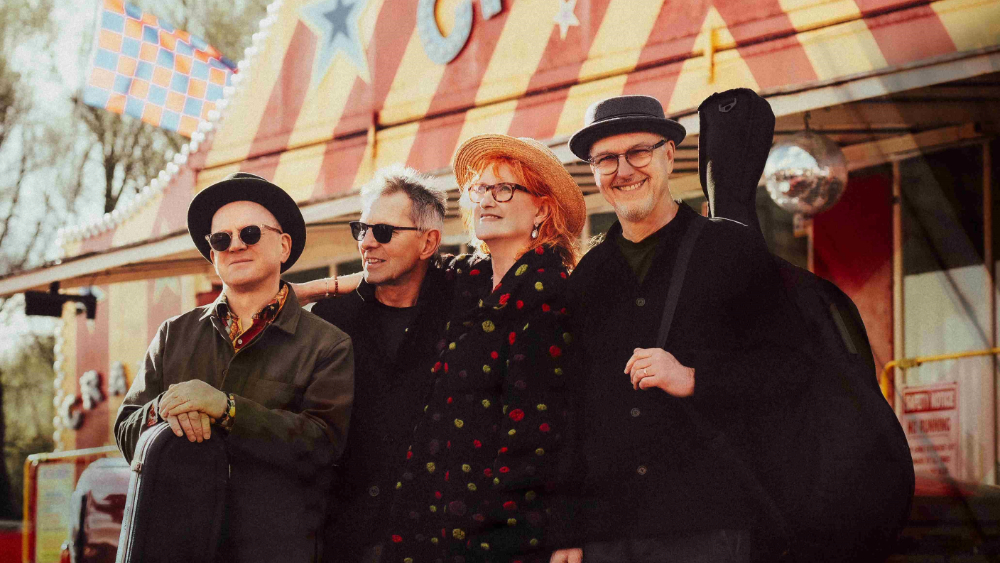‘There’s some music you write that no longer belongs to you,’ acknowledges lyricist, playwright and director Leslie Stewart, one of the co-creators of the ubiquitous festive classic Mistletoe and Wine. ‘Everyone has their own interpretation of it, and this piece has taken on a life of its own.’
To say that Mistletoe and Wine, sung by Cliff Richard and co-written by Leslie, Keith Strachan and the late Jeremy Paul, was a success would undersell its true impact. The song spent four weeks at number one in the UK in December 1988 and became the biggest-selling single of that year with over 750,000 copies. The following year, its three co-writers won an Ivor Novello Award for Best Selling A-Side.
The track has since gone on to become part of the cultural fabric of the festive season, as synonymous with the holidays as Santa Claus, John Lewis adverts and the string of pop hits from The Pogues, Slade and Mariah Carey that dominate playlists at this time of year.
‘When you hear certain songs, they’re like earworms,’ Keith tells M. ‘They get into your brain and you can’t get rid of them. Mistletoe and Wine is like that: it’s a song many people either love or hate. I’ve had hundreds of people come up to me and tell me it’s awful.’
The origins of the song can be traced back to the early 1970s at the London School of Fashion, where Leslie and Keith’s paths crossed for the first time.
‘I met a drummer at college who told me he knew of a band looking for a lyricist, and asked if I wrote poetry,’ Leslie recalls. ‘I told him I did, and so I went to meet this jazz-rock outfit, Swegas. I started writing lyrics with one of their band members, who happened to be Keith Strachan.’
Swegas bowed out for good in September 1971, but Leslie and Keith maintained their songwriting partnership. ‘We just hit it off, and still do!’ Leslie tells M. ‘We had a wonderful relationship as co-writers. One of the main pleasures for me was hearing what Keith would do with my lyrics; I’ve always really enjoyed that process.’
The pair initially explored musical theatre, working together with Jeremy on an adaptation of Hans Christian Andersen's The Little Match Girl. The show, titled Scraps, premiered at the Orange Tree Theatre in Richmond in December 1977 and featured an early version of Mistletoe and Wine. Rather than using an existing Christmas carol in the play, the production team wanted something bespoke.
‘I thought we’d written the whole [show already],’ Leslie remembers. ‘I took my little boxer dog for a walk as I was a bit cross about the situation, and this line just came to me — “It’s a time for giving, a time for getting, a time for forgiving and for forgetting” —and I thought, “That’s it!” I rushed home, sat down and wrote it in about 20 minutes. I’ve often found writing hard work, but this just came to me.’
Answerphone machines also played a key role in the writing of Mistletoe and Wine. As Leslie and Keith were often working in different spaces, they’d call each other and leave messages with their ideas.
‘Mistletoe and Wine was a product of this process,’ Leslie explains. ‘I’d call Keith and say, “Don’t answer, just put your answerphone on and I’ll talk the lyrics over the phone”. Keith would then call me back, and I’d record whatever musical accompaniment he’d come up with on my answerphone.’
'I took my dog for a walk, and this line just came to me — “It’s a time for giving, a time for getting, a time for forgiving and for forgetting” — and I thought, “That’s it!”' - Leslie Stewart
In terms of the musical composition, Keith recalls a similarly rapid creative process. After placing Leslie’s lyrics in front of him at the piano, the songwriter was able to compose the music in just 30 minutes.
‘I knew it was good as it was one of those songs where you want to hear the chorus again and again — that’s the key to a hit song,’ Keith tells M. ‘It had a harmony that worked well and I just couldn’t get it out of my brain. If that’s the scenario, then you know it’s great.’
Scraps was adapted for television 10 years later as The Little Match Girl, with Twiggy and The Who’s Roger Daltrey in starring roles. It was through the connections of its director Michael Custance, Keith recalls, that Mistletoe and Wine then found its way to Cliff Richard.
‘For a Christmas song to work, you have to have someone of a suitable profile to perform it,’ Keith adds. ‘Michael said his neighbour — the singer-songwriter and producer Terry Britten — knew Cliff and would get it to him. I ended up getting a call from Cliff’s then-manager Peter Gormley, who thought it would be ideal for Cliff.’
The original themes of the song centred around the neglect and hypocrisy of the middle-class, but these subjects subtly evolved when Cliff picked it up.
‘The [titular] Little Match Girl dies while a choir sings the song: it's an incredibly powerful moment,’ Leslie says of its role in their production. ‘But since Mistletoe and Wine has become this Christmas song, it has taken on a slightly different, more “born again” Christian meaning.’
‘I knew Mistletoe and Wine was good as it was one of those songs where you want to hear the chorus again and again — that’s the key to a hit song.' - Keith Strachan
The huge success of the track was unimaginable to any of its writers. Despite only being released in November Mistletoe and Wine became the biggest-selling single of 1988, beating the likes of Kylie and Jason’s Especially For You to the top spot.
‘We had a ball,’ Leslie says now. ‘Although at the time I had imposter syndrome as I was never really part of the pop world — I was a writer of musicals. But when we were awarded our Ivor Novello, we were joined on stage by all the songwriters who had written number ones for Cliff Richard. It was extraordinary to be surrounded by all these songwriters from my childhood who I loved and respected.’
As well as Mistletoe and Wine, Keith is arguably best known for composing the music for the hit game show Who Wants to Be a Millionaire? along with his late son Matthew Strachan.
‘The strange thing is that although I’ve written music all of my working life, I will be remembered for two things,’ he tells M. ‘One is a song that took me half an hour to write, the other is a game show that took me a fortnight to write. It’s strange, isn’t it?’
For Leslie, Mistletoe and Wine is also a huge part of his career — but, as he acknowledges, it's a song that's bigger than anyone who was involved in its composition.
‘It's now become a family tradition where it's the first song we play on Christmas morning,’ he says. ‘But to be honest, I can walk into shops in December, it'll be playing on the speakers and it will take me a minute to realise what it is. It almost doesn't feel like our song any more.’





